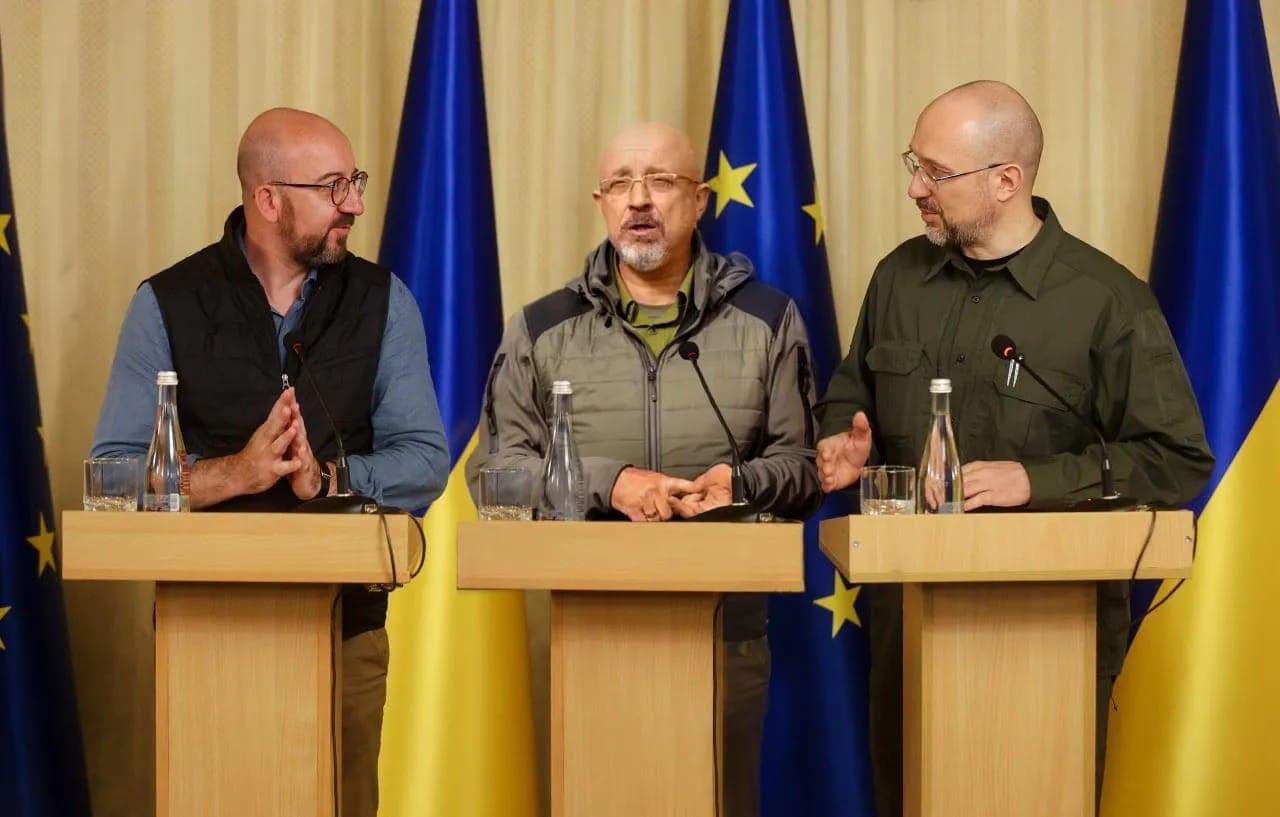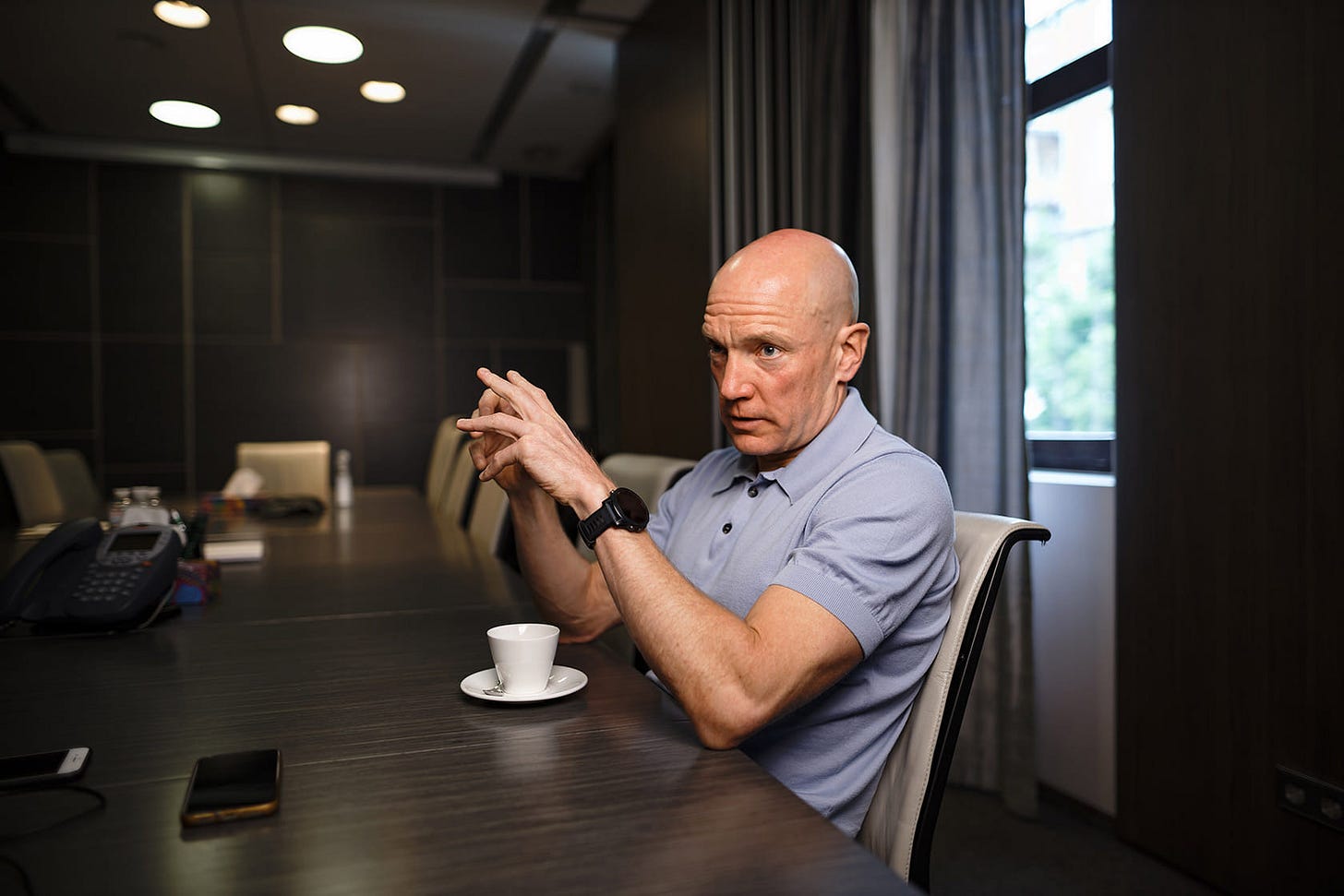Zelensky versus the Sorosite fifth column, part 1
Attack on pro-western business elites. Retribution for critical coverage in pro-western media publications.
If you like my work and want to access future part 2 of this series, consider becoming a paid subscriber.
Over the past several months, an old front has reopened with renewed ferocity - the struggle between president Zelensky and his inner circle, led by the grey cardinal head of the president’s office Andriy Yermak, and western-funded/oriented journalists, anti-corruption NGOs, and businessmen.
The pro-western forces, which I will henceforth call ‘Sorosites’, in deference to the existing Ukrainian tradition (‘Sorosyata’, or Soros’s piglets), function as the local colonial administration of the US. When, in the past, they grew seriously dissatisfied with a government, it has usually meant its end, whether it be that of Viktor Yanukovych or Petro Poroshenko. The journalists publish thundering investigations into government corruption, the anti-corruption NGOs (now integrated into the state juridical system on all-powerful, extra-constitutional grounds) make formal accusations of financial impropriety, and the Sorosites marshal forces in parliament and on the streets.
When the Sorosites are not listened to, the US embassy puts out a statement urging the Ukrainian government to heed the struggle against corruption and maintain freedom of speech. Over the years, the US embassy has put out countless official statements urging the Ukrainian government to keep their hands off key Sorosites like Shabunin and Sytnyk, who have themselves been implicated in a myriad of corruption scandals. Naturally, such statements are never to be seen when it comes to censorship of other media groups, like what happened in 2021.
Before we get to the current struggle, a bit of background is necessary. When Zelensky was elected in 2020, the Sorosites treated him with disgust. Though many of them were tired with Poroshenko’s own oligarchic ambitions, which often interfered with their ability to influence state decisions, they viewed Zelensky as a populist sponsored by retrograde domestic oligarchs and, possibly, Russia. They also made much of the fact that Zelensky purged his cabinet of ‘young reformers’ in 2020, removing many of the big anti-corruption names so beloved by the US embassy.
While it seems like most of the Ukrainian oligarchy was aligned behind Zelensky due to their fear of Poroshenko’s ever-growing ambitions (an old story in post-soviet Ukraine), Zelensky’s number 1 sponsor was also his employer in the TV world - Igor Kolomoisky. Kolomoisky got on the nerves of the Sorosites and their sponsors so much that he was even sanctioned by the US government in 2021.
Even though Kolomoisky and many of his deputies have been jailed since 2022, pro-Kolomoisky deputy (now behind bars) Alexandr Dubinsky continues his telegram crusade against the Sorosites. Recently, he has been writing forcefully in favor of the theory that the top anti-corruption warriors are FSB-sponsored sleeper agents. While it’s outside the scope of this article, much of the Sorosites ire against the colorful oligarch was due to the fact that by around 2016 Kolomoisky was actively supporting both the Minsk Agreements and Trump against Biden, two hard redlines of Ukraine’s Sorosites.
One of Kolomoisky’s many amusing arguments with top Sorosite Mustafa Naiem (the man who started Euromaidan). The argument, featuring a bunch of imaginative swearing and insults on Kolomoisky’s behalf, turns around a business dispute, insofar as Kolomoisky had sent some of his ‘patriotic’ goons to appropriate a state-owned factory.
In 2021, Zelensky proved he wasn’t going to play the ever-so frightening role of ‘Moscow’s peacemaker’, placing sanctions on pro-peace media publications and political figures through presidential decree. While he also half-heartedly prosecuted Poroshenko, overall the Sorosites were hardly too worried about their new president, at least in comparison to what had come before. They complained about corruption and insufficient attention paid to the anti-corruption organs, but when did they ever not do that.
In early 2022, the Sorosites’ main worry was whether Zelensky would bow to Russian pressure and implement the Minsk agreements, thereby blocking Ukraine’s ability to join NATO and the EU. To their relief, that didn’t happen and instead Russia militarily intervened on February 24. For about a year, conflicts between the Sorosites and Zelensky seemingly evaporated, amidst the overall patriotic jubilation.
By mid-2023, the failed counter-offensive set loose political steam that had long-built up. Sorosites released scandalous investigations into corruption in the ministry of defense, leading to the firing of defense minister Oleksiy Reznikov. While at first there were rumors he would be appointed ambassador to the UK, he lost that honor to the decidedly more reluctant General Zaluzhny, and as of 2024 he has resumed his old job as a lawyer.

Reznikov was a classic figure of Zelensky/Yermak’s entourage - a savvy east-Ukrainian lawyer who made his money by profiting off oligarchic disputes, whose main preoccupation in the ministerial seat was the media and selling eggs for two to three times the market price. Getting rid of him was a sign that the Sorosites were getting ready to go after his bosses.
There were also other moves, such as the May 4 2023 arrest on corruption charges by anti-corruption organs of the mayor of Odessa Trukhanov. Trukhanov was a member of Zelensky’s party whose mafiosi venality was particularly notorious. Nevertheless, he was released after spending one night in prison by paying 13 million hryvnias in bond, and he remains the mayor to this date.
After Reznikov was sacked, things seemed to calm down. But then in early December 2023, the Sorosites made another thrust, this time in the media field - an editorial appeared in the premier Sorosite publication, Ukrainian Truth. The article argued that Ukraine’s state-owned media constantly distorted the truth of what was happening on the battlefield, covering up official mistakes and corruption and leading to a decline in public trust of the media and government. They called the results of Zelensky’s media policy ‘friendly fire’, since not only did it reduce public trust in the government, it also created a false sense of security among Ukrainians, who believed that they could lay back and relax as the invincible AFU mopped up the fleeing, incompetent Russian orcs.
The New York Times duly picked up on this story in early January 2024, publishing its own criticism of Zelensky’s media machine. Hardly flattering, especially for a president for whom mediatizing his image is of such paramount importance.
The Sorosites also took aim at Zelensky in a wide range of other fields - they supported Zaluzhny, they criticized his military strategy, they constantly uncovered new forms of military corruption, they released near-weekly exposes of government figures busy on ‘the Monaco Front’ or ‘the Vienna Front’ since 2022.
Vitaly Shabunin’s National Agency for the Prevention of Corruption even accused the docile, loyal Prime Minister Shmyhal of 131 acts of corruption on January 10 2024, threatening him with a fine of up to 302,000 hryvnia unless an investigation reveals his innocence.

Towards the end of 2023, the Office of the President set upon its own counter-offensive against the Sorosites. Bankova - the street on which the Office is located - publicized through its much-derided television channels the fact that presidential sanctions had been implemented against companies owned by Tomas Fiala on December 23. Fiala is Soros’ old business partner, a Czech businessman whose company Dragon Capital owns Ukrainian Truth and a range of other media publications and agrobusinesses.
Bankova has been having problems with Fiala for a long time. Back in November 2023, Marianna Bezuglaya, a parliamentarian whose fierce defense of Zelensky seems to know no bounds, accused Fiala of being responsible for the dramatic November 2023 publication in the Economist critical of Zelensky and positive towards Zaluzhny, which seemed to signal a shift in opinion among western elites against Bankova.
In late 2023, state-owned TV gleefully recounted the details of the case against Fiala, which revolves around Fiala’s supposed continued business activities in Russian-controlled Crimea. In response, the owner of Dragon Capital called tales of his involvement in Crimean business "black PR" in response to his support for freedom of speech and his "call for the changes necessary for faster Euro-Atlantic integration of Ukraine."
Fiala was not the only pro-western businessman to suffer. On January 18, information appeared that Igor Mazepa, famous investment banker and owned of Concorde Capital, was arrested on the border with Poland. Mazepa was accused of corrupt agrobusiness dealings involving Poroshenko.
If this case against Fiala is successful, it could see Zelensky finally eradicating the last pole of open media criticism against him - the Sorosite media ecosphere. Of course, Poroshenko still has plenty of journalists on his side, but if the west allows Zelensky to get away with liquidating their Sorosites, they would surely allow him to do the same with Poroshenko, who doesn’t enjoy the same perfect relations with the State Department the Sorosites do.



